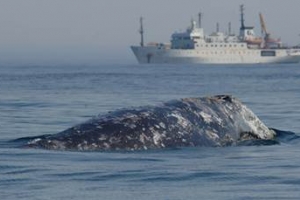Searching for oil and gas reserves

In April, President Trump signed an executive order authorizing further gas and oil exploration of the Arctic and Atlantic oceans as part of his promise to unleash more of America’s energy reserves while reducing the country’s dependence on foreign oil. More recently, it was announced that five companies were seeking permits to use seismic air guns to conduct surveys in search of new fossil fuel deposits.
How seismic surveys work
Geological and geophysical surveys, commonly known as seismic surveys, are considered the most accurate means of determining petroleum reserves in the earth’s crust. A seismic survey is created when an energy source or explosion at the surface of the earth travels into the earth and bounces off the subsurface formations below. The amount of time it takes the sound wave to travel back to the surface is then analyzed to determine pockets where oil & gas reserves might be found.
Banning seismic surveys
In response to Trump's order, a group of U.S. Senators, including New Hampshire Senators Jeanne Shaheen and Maggie Hassan, recently introduced a federal bill that would prohibit the use of seismic airgun blasting for offshore oil & gas in the Atlantic ocean.
Opponents of seismic surveys say that almost all marine mammals and reptiles communicate and navigate by sound and are therefore seriously harmed by these seismic airguns, causing damage to hearing, changes in behavior, and sometimes even death. Recreational and commercial fisherman state that their industry would be economically devastated by the use of seismic sound waves.
Arguments in favor
Proponents claim that advances in seismic survey technology have dramatically increased the industry’s ability to locate oil & natural gas. They argue that this new technology has lowered costs and allowed exploration of reserves that could not be discovered using other methods. In addition they say that there is no direct relationship between seismic tests and any damage to whales, dolphins, and other marine life.











Comments
Login or register to post comments